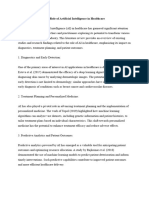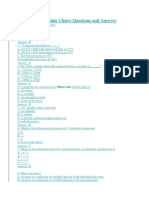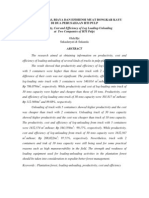The Role of Artificial Intelligence in Modern Healthcare
Artificial Intelligence (AI) has emerged as a transformative force in the healthcare sector,
revolutionizing diagnostics, treatment, and patient care. This literature review explores the
significant advancements and applications of AI in healthcare, drawing from recent studies
and research.
Diagnostic Accuracy and Efficiency
AI's ability to analyze vast datasets with precision has significantly improved diagnostic
accuracy. One of the most notable applications is in medical imaging. Studies, such as those
by Esteva et al. (2017), have demonstrated that AI algorithms can match or even surpass
human experts in diagnosing skin cancer from images. Similarly, AI systems have shown
remarkable proficiency in interpreting radiological images, including X-rays, MRIs, and CT
scans, as reported by Litjens et al. (2017).
Personalized Medicine
AI is also playing a crucial role in the field of personalized medicine. By analyzing genetic
information and patient histories, AI can help in creating tailored treatment plans. The work
by Kourou et al. (2015) highlights how machine learning models can predict patient
responses to various treatments, thus optimizing therapeutic strategies. This personalized
approach not only enhances treatment efficacy but also minimizes adverse effects, improving
overall patient outcomes.
Predictive Analytics and Preventive Care
Predictive analytics powered by AI is transforming preventive care by identifying potential
health risks before they become critical. Research by Rajkomar et al. (2018) shows that AI
can predict the likelihood of hospital readmissions and disease outbreaks, enabling healthcare
providers to intervene early. This proactive approach is particularly beneficial for managing
chronic diseases like diabetes and cardiovascular conditions, as AI models can monitor
patient data in real-time and suggest timely interventions.
Operational Efficiency
Beyond direct patient care, AI is enhancing operational efficiency within healthcare systems.
AI-driven tools are streamlining administrative tasks, such as patient scheduling, billing, and
resource allocation. A study by Jiang et al. (2017) illustrates how AI can optimize hospital
workflows, reduce wait times, and improve resource management, ultimately leading to
better patient satisfaction and reduced operational costs.
Ethical and Privacy Considerations
Despite the numerous benefits, the integration of AI in healthcare also raises ethical and
privacy concerns. The potential for bias in AI algorithms is a significant issue, as highlighted
by Obermeyer et al. (2019). AI systems trained on biased data can perpetuate and even
amplify existing disparities in healthcare. Additionally, the use of AI in handling sensitive
patient data necessitates robust data protection measures to prevent breaches and ensure
patient confidentiality.
�Future Directions
The future of AI in healthcare holds immense promise, with ongoing research focused on
overcoming current limitations. The development of explainable AI, which provides
transparency in decision-making processes, is a key area of interest. Furthermore,
interdisciplinary collaboration between AI experts, healthcare professionals, and
policymakers is crucial to address ethical concerns and establish regulatory frameworks that
ensure the safe and equitable deployment of AI technologies in healthcare.
Conclusion
In conclusion, AI is poised to revolutionize healthcare by enhancing diagnostic accuracy,
personalizing treatment, predicting health risks, and improving operational efficiency.
However, careful consideration of ethical and privacy issues is essential to fully realize the
potential of AI in delivering high-quality, equitable healthcare. Continued research and
collaboration will be pivotal in harnessing the power of AI to transform the healthcare
landscape.






















































































